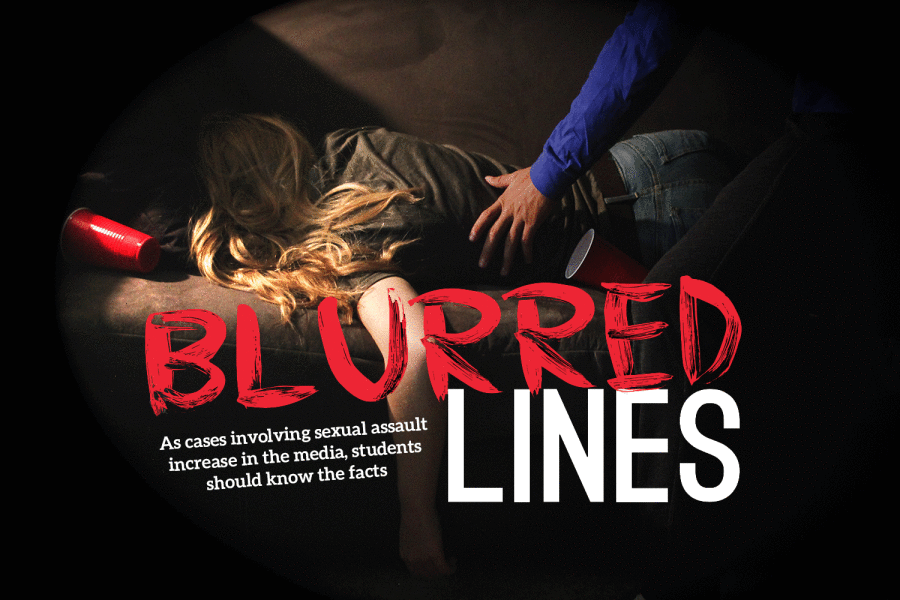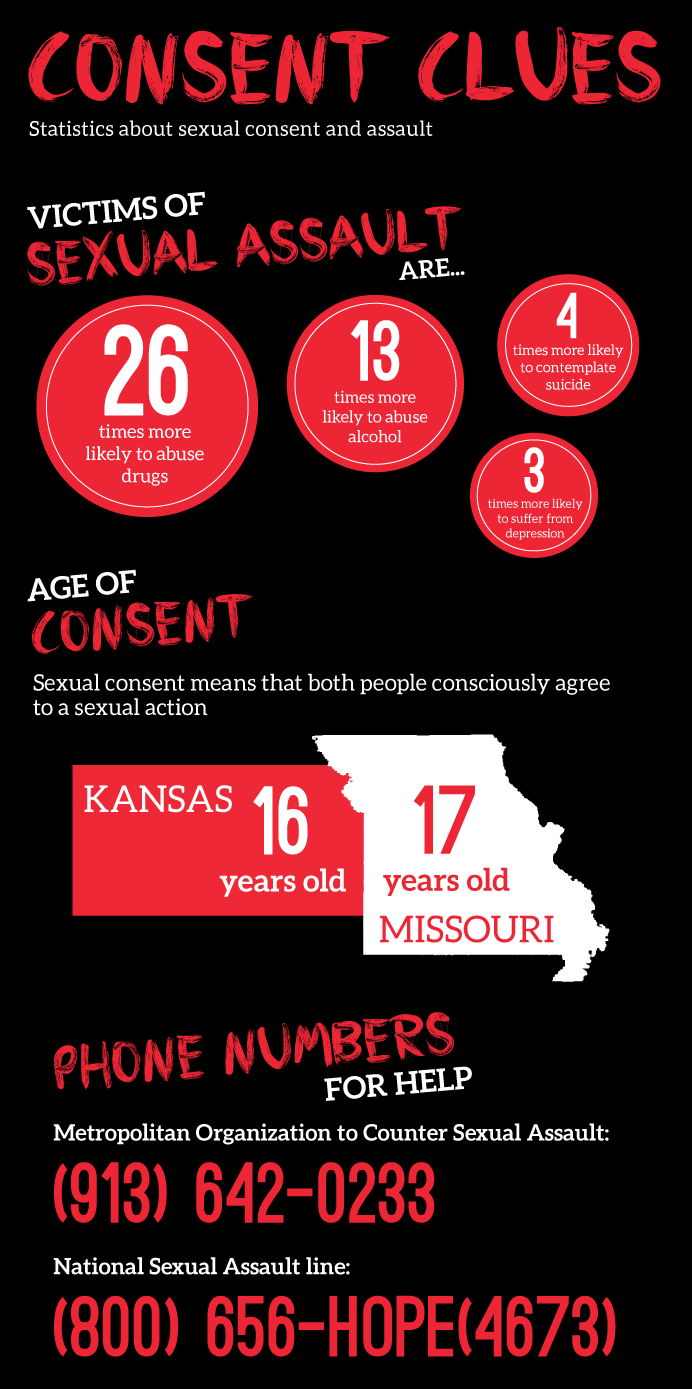Students lack knowledge of sexual consent
Students need to know the facts surrounding consent and assault
October 27, 2015
She met him over spring break. After hanging out a couple times, he invited her to a party. Although she hadn’t known him long, he seemed like a nice guy, so she agreed. He picked her up with a couple of his buddies.
Once at the party, this senior girl, who wishes to remain anonymous, started drinking beer and taking shots, while he stayed sober enough to drive her home. When she got home that night, she received a text from him.
“Hey,” his message read, “You might want to get a Plan B pill. I’ll pay you for it.”
She has no memory of what happened at the party, and was shocked to later find out from someone else that she and the guy had sex in his car. Initially, she blamed herself.
“First it didn’t really bother me. I was kind of thinking it was my fault and that I shouldn’t have gotten that drunk with him,” she said. “I told my friends and they were like ‘You were raped. If you don’t know what happened then you weren’t able to say yes or no … You couldn’t have known what was going on.’”
Her friends were correct, and she’s not alone.
THE FACTS
This senior girl encountered sexual assault because she was not able to give consent to the sexual actions; one in four girls and one in six boys will have a similar experience with sexual assault before she or he reaches 18, according to Safehome peer education coordinator Monica Phinney.
Safehome, an organization aimed at “supporting survivors of domestic and intimate partner violence,” visits Mill Valley family and consumer science classes three times throughout the school year to educate students on issues such as bullying, dating violence and sexual assault.
“Sexual assault is any sexual contact … that happens without consent,” Phinney said via email. “Sexual assault is an ‘umbrella’ term that includes other terms within that category, like rape and sodomy … Sexual assault includes all other sexual contact as well, such as fondling, touching and kissing without consent.”
Sexual consent means that both people consciously agree to a sexual action, according to Phinney, and is only valid when both participants are not threatened.
“If a person didn’t feel safe to say no, then their ‘yes’ doesn’t actually mean anything, which means it’s not always consent just because they didn’t say ‘no’,” Phinney said.
BLURRING THE LINES
Several factors, including alcohol and age, can directly affect the presence or lack of consent.
According to information from the Metropolitan Organization to Counter Sexual Assault, there are certain instances which plainly signify that sexual assault has occurred. One cannot give consent if he or she is under the influence of drugs or alcohol, scared or threatened, blackmailed or coerced, physically forced, sleeping or passed out. Furthermore, those with disabilities who have guardians or those who are under the age of consent cannot give consent.
Approximately one-half of sexual assault cases involve alcohol consumption by the perpetrator, victim, or both, making it the number one drug to facilitate rape, as reported by the National Institute on Alcohol Abuse and Alcoholism.
“Drugs and alcohol also limit the ability to make decisions, physically resist, and fully comprehend what’s going on around them,” Phinney said. “If someone doesn’t have their full decision making capabilities, they might appear to be okay with something they would normally not be okay with.”
The anonymous senior girl’s experience at the party shows alcohol’s detrimental effect on decision making.
“I didn’t want anybody to be mad at me because I don’t really know what happened,” she said. “I met him the week before, I never would have said yes [had I been sober].”
Along with drugs and alcohol, age also limits one’s ability to give consent. In Kansas, the legal age of consent is 16. According to Phinney, those younger than 16 cannot consent because “they are too young to fully understand all the consequences” and therefore their consent is not valid.
Although the consent is not legal when one is younger than 16, 29 percent of sexual assaults are of victims ages 12-17, according to the Rape, Abuse & Incest National Network (RAINN).
Health teacher Amy McClure feels as if age has a large impact on a teenager’s ability to give consent.
“For example, if a senior boy shows an interest in a freshman girl and the girl thinks for a second that that senior boy is interested, that might have an impact on her decision [to have sex],” McClure said. “He may or may not want a relationship but yet puts that pressure on that person because they’re younger.”
THE CONSEQUENCES
Sexual assault frequently results in psychological harm for the victim.
Studies done by the Joyful Heart Foundation, an organization centered around ending sexual assault and violence, have shown that the overwhelming effect sexual assault can have on a victim can be staggering and may impact the way the victim perceives other people, situations and intentions.
The anonymous senior girl said the incident at the party has affected her ability to trust others.
“Now I’m really scared to drink or [do] anything around anybody,” the anonymous girl said. “I’m just scared to be around people now because I just don’t know what’s going to happen.”
According to the RAINN, those affected by sexual assault are three times more likely to suffer from depression, 13 times more likely to abuse alcohol and 26 times more likely to abuse drugs.
Legal consequences for the perpetrator can differ, and potentially be life-altering.
Judges in Kansas have the power to choose a sentence based on both Kansas’ sentencing guidelines and the perpetrator’s prior criminal history or the lack thereof.
Circumstances vary, but sexual assault of a minor can result in life in prison and $500,000 in fines.
AFTER THE FACT: HOW TO REPORT IT
Kansas law states that for both aggravated sodomy and rape, there is no time limit in which a perpetrator can be charged with the crime. However, for other sexual assault cases in which the victim is 18 years old or older, one has 10 years to give a police report after the assault has occured. In cases where the victim is younger than 18, the victim has 10 years after they turn 18 to report the assault.
While physical evidence is not necessarily required to make a report, it aids in building evidence against the perpetrator. To give a report, one can directly call the police, seek help from a sexual assault agency, such as Safehome or MOCSA, or contact a hospital.
“[Safehome] recommends that people don’t shower, don’t change clothes and just go straight to get an examination done,” Phinney said. “In the examination, it is helpful for people to consent to as much of it as they are comfortable with — that includes collection of possible DNA, pictures of any injuries, etc. The examiner also asks questions about the incident, so the victim can put down on record their side of the story.”
At Mill Valley, student resource office Mo Loridon recommends that students who need to report an instance of sexual assault should address either him or school social worker Debbie Gudenkauf.
“I hope that the students at Mill Valley feel comfortable enough to talk to me but if they don’t, then I will find them someone else they can talk to,” Loridon said.
Social worker Debbie Gudenkauf says that she is always open to talk to students about sexual assault situations.
“Just sign out on your agenda and come see me,” Gudenkauf said. “I’ve worked with quite a few kids who have been survivors, and eventually thrivers.”
KNOWING THE DIFFERENCE
While there has been a decrease in sexual assault across the nation, approximately 49 percent since 1993 according to RAINN, the topic has become increasingly popular because, according to Phinney, people “are just more willing to talk about it.”
Some colleges are now implementing programs that teach students about the importance of sexual consent and the dangers of assault that are necessary for lives on campus.
For example, the University of Central Missouri has enforced an online course that is required for students to live in its dorms, according to UCM freshman and 2015 Mill Valley graduate Kylie Tennis. The course, deemed Haven, teaches students about sexual assault, how to avoid sexual assault and how to help someone if you see them sexually assaulted.
“[Students] have to [take the course] so that there is awareness of sexual assault on our campus,” Tennis said. “We’ve actually already had a few sexual assaults on campus, so we had to retake a part of [Haven].”
According to the anonymous source, her encounter with sexual assault might have been prevented had the other person involved been aware of the signs that validate consent.
“If he would’ve known that it’s not legal,” the anonymous senior girl said, “he definitely wouldn’t have done anything.”

